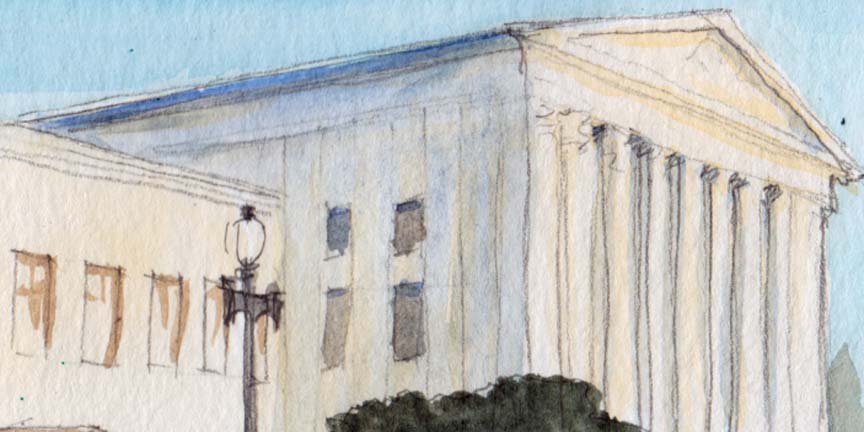Wednesday round-up

Charlotte Garden has this blog‘s analysis of Monday’s opinion in Fort Bend County v. Davis, which held that Title VII’s requirement that a plaintiff exhaust administrative remedies before filing suit is a nonjurisdictional claim-processing rule that can be waived by an employer. At this eponymous blog, Ross Runkel notes that the decision “does not give employee-plaintiffs a free pass[: …] Employers can still get cases dismissed for failure to exhaust if they raise the issue early on in the litigation.” Abbe Gluck and Anne Joseph O’Connell analyze the opinion in Azar v. Allina Health Services, in which the court ruled that the Department of Health and Human Services was required to conduct notice-and-comment rulemaking before altering its Medicare hospital-reimbursement formula, for this blog. In an op-ed at the Washington Examiner, Adam Carrington welcomes the result as “an affirmation of the rule of law.”
This blog‘s analysis of the opinion in Mont v. United States, in which the court held that pretrial imprisonment on a new criminal charge can suspend a term of federal supervised release, comes from Fiona Doherty. At Reason’s Volokh Conspiracy blog, Jonathan Adler remarks on the “particularly unusual—indeed unprecedented—line up of justices” in the 5-4 decision. And Ronald Mann analyzes Monday’s fourth opinion, Taggart v. Lorenzen, which held that a court can sanction a creditor for violating a bankruptcy discharge order only if there is no objectively reasonable ground to doubt that the order barred the creditor’s conduct, for this blog. At WSJ Pro, Jonathan Randles reports that “Justice Stephen Breyer described Monday’s ruling as a middle ground between a stricter test and a more lenient, subjective standard giving weight to creditors who argue they didn’t realize a bankruptcy had wiped out debt.”
In an op-ed at Bloomberg Law, Tyler Cooper makes the case for enacting term limits for Supreme Court justices, noting that “[t]he founders knowingly circumscribed only minimal guidance for the third branch, allowing it to be adjusted to fit the needs of the nation (cf., initially omitting judicial review), and maintaining that a “time when the high court’s legitimacy is questioned, as it is now, is the time to make an adjustment.” At The Nation, Joshua Holland considers various court-reform proposals, concluding that “[w]e need to think more broadly about how to restore the Court’s legitimacy—and bring some decorum to our circus-like confirmation process—without continuing to aggravate its partisan nature and reinforcing its antidemocratic nature.”
Briefly:
- At The National Law Journal, Marcia Coyle reports that “a quiet fight over the constitutionality of the president’s power to impose certain trade tariffs is underway in the U.S. Supreme Court,” as the justices prepare to consider a cert petition in American Institute for International Steel v. United States challenging steel and aluminum tariffs imposed last year as the product of “an unconstitutional delegation of Congress’ power to the president that violates the Constitution’s separation of powers.”
- Amy Howe reports for this blog, in a post that first appeared at Howe on the Court, that the government notified the Supreme Court yesterday of its response to new evidence submitted to a district court in a challenge to the administration’s decision to add a citizenship question to the 2020 census that is the subject of a pending Supreme Court case, Department of Commerce v. New York, “calling the challengers’ accusations ‘meritless’ and an ‘eleventh-hour’ effort to ‘derail the Supreme Court’s resolution of this case.'”
- At his eponymous blog, Sheldon Nahmod discusses last week’s decision in Nieves v. Bartlett, in which the court held that a plaintiff’s First Amendment retaliatory-arrest claim failed because police officers had probable cause to arrest him.
- At the National Conference of State Legislators’ blog, Lisa Soronen looks at Allen v. Cooper, in which the court will decide next term whether the Constitution gives Congress power to revoke the states’ immunity from suit for copyright infringement.
- At the Constitutional Accountability Center blog, Elizabeth Wydra maintains that Chief Justice John “Roberts is in danger of losing his battle to keep the court he leads divorced from politics” and urges him to “steer the Court away from the activist conservative extreme and back toward the middle of the road.”
We rely on our readers to send us links for our round-up. If you have or know of a recent (published in the last two or three days) article, post, podcast, or op-ed relating to the Supreme Court that you’d like us to consider for inclusion in the round-up, please send it to roundup [at] scotusblog.com. Thank you!
Posted in Newsletters